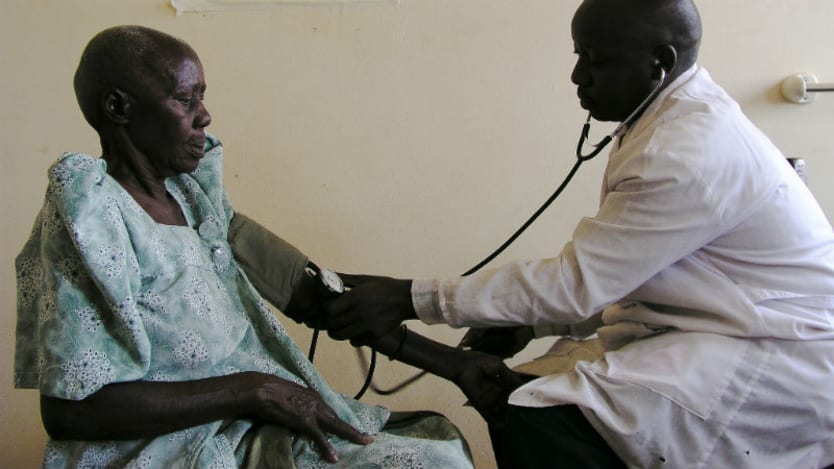
NAIROBI — The disease burden on the African continent is shifting from infectious diseases, such as HIV and tuberculosis, to noncommunicable diseases, such as cancer, diabetes, and cardiovascular disease. This change has been fueled by factors such as globalization, which has pushed populations into crowded, polluted cities where fast food restaurants are abundant and lifestyles are stressful. But while the number of NCD cases on the continent continues to grow, funding for these types of diseases has not yet met the need.
Reducing deaths from these types of diseases is one of the United Nations priorities, with a goal of cutting the cases of premature mortality from NCDs by a third by 2030. But reaching this goal won’t be easy. The continent is currently in short supply of specialized physicians and medical equipment, making it difficult to keep pace with the growing caseload, among other challenges. NCDs are often more difficult to treat than infectious diseases, requiring more complex and expensive treatment plans.
Advocates seek noncommunicable disease funding mechanisms
This year's U.N. high-level meeting on NCDs could be a pivotal moment to talk about funding the fight against these chronic conditions. Mobilizing domestic resources will be vital to meeting global targets, experts and officials told Devex.
While more funding is needed, money alone won’t be enough to reach the U.N. goal. Getting more value out of each dollar spent on NCDs is key to financing efforts to manage the diseases moving forward, said panelists at the “Building Solutions to Patient Challenges in Non-Communicable Diseases” conference in Nairobi. Panelists suggested this can be done through fund matching agreements, governments contracting out services like drug distribution, mobile money wallets focused on health, and telemedicine, among other efforts.
Much about the way African health systems are currently tackling these diseases is inefficient. Lack of proper prevention and screening measures means patients are often misdiagnosed or diagnosed late, which increases the cost and intensity of the treatment, Khama Rogo, head of the World Bank Group's Health in Africa Initiative, told the audience. With cancer cases, for example, doctors on the continent are more likely to see late-stage cases of cancer than to catch the disease early.
“Noncommunicable disease management is one of the most inefficient areas of expenditure on this continent,” said Rogo.
Government funds
Broadly speaking, African governments do not spend enough on health care. While governments pledged in 2001 through the Abuja Declaration to commit 15 percent of their annual budgets to public health spending, only a few countries have actually achieved the target. Within health care spending, funding for NCDs is even less of a priority, Andreas Seiter, global lead for private sector health, nutrition, and population for the World Bank, told the audience.
“Governments are underspending on health and massively underspending on NCDs,” he said.
Moreover, when external donors provide funds to countries for health care, governments in Africa have demonstrated a tendency to divert the funds that they had been planning to spend on health care to other sectors, said Seiter. To avoid this, donors should work on matching fund agreements with governments so that donor funds are coupled with and dependent on domestic contributions.
With the funds they do have, governments should not overcommit themselves, such as by investing in areas where it might make more sense to hire a contractor. Investing in government-run drug distribution infrastructure, for example, might not be a wise use of funds, said Seiter.
“There are areas where public spending may not be particularly efficient,” he said. “You find government medicines in private pharmacies. How did that happen? These are the kind of examples where resources are not optimally used.”
Governments can also raise revenue through “sin taxes,” which are taxes on products such as cigarettes, alcohol, and sodas. But pushing these types of taxes through legislatures can be politically sensitive.
“There is resistance from the industries that are selling these products. They have a lot of money. They can buy influence,” said Seiter. “Often, it’s the lack of political will, or the lack of ability of those that have political will to actually get the majority behind it and make the final decision.”
Using tech to reduce inefficiencies
Across the continent, most NCD financing comes out of the pocket of patients, said Seiter. Technology can be used to pool those fragmented payments so that they can be used to put pressure on service providers to improve the quality of their services and products. This could be done through applications like the mobile money wallet M-TIBA, which is essentially a subaccount of a mobile money system that is used for paying for health care, he said. Governments could transfer funds to their citizens through this service after negotiating with quality service providers and pharmacies on prices. The funds then could only be spent exclusively at those health care chains.
Some investors have been discouraged from investing in NCD health care because there are so many disjoined efforts to provide care, said Seiter. The use of M-TIBA on a larger scale could help push for the creation of larger, more consolidated health providers and pharmacies, with stronger internal capacities, such as management and IT systems.
“This would be a way to pool the private purchasing power to put pressure on the market of providers to provide better quality, squeeze out the ‘quacks,’ squeeze out the drug stores that sell substandard drugs, and attract investment in quality primary care,” he said.
In order to tackle these diseases, a better understanding of the actual disease burden in countries, types of treatments that have been used, and the cost of that treatment would help countries to more strategically target the diseases. Widespread use of applications like M-TIBA could help to build these databases by collecting data from users, said Menassie Taddese, regional lead of Africa and the Middle East for Pfizer. The Pfizer Foundation is one of the funders of M-TIBA.
“A big part of designing health care is figuring out what are you trying to treat. What is the disease burden? What’s costing you the most? You are going to have to be able to come up with that data,” said Taddese.
Geographical barriers are also driving up the price of treating NCDs. With limited specialized technicians, patients have to often travel long distances in order to be treated. In Kenya, for example, the nation’s only oncologists are in the capital city of Nairobi, said panelists. Telemedicine could help bridge these geographical gaps by working to connect patients and doctors through video conference, said Seiter.








